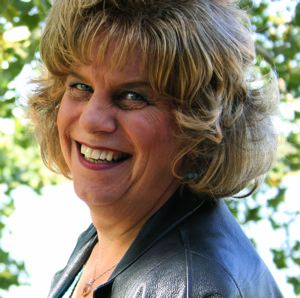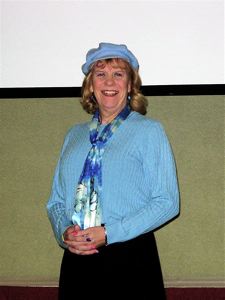
Retired high school librarian Debra Davis has done it a thousand times.
Over the last two decades, the trans woman has done it in hospitals, police stations, non-profit organizations, religious institutions, business meetings, and on campuses across the county. She’s even done it on television and in front of elementary students!
She’s so proud of what she’s doing Davis says she has no plans to stop. After all, she is the executive director of the Gender Education Center—a Minnesota organization dedicated to support, advocacy and education for differently gendered people—and it’s part of her job.
Davis travels the country speaking on transgender issues. When she reached the thousand-presentation mark earlier this year, Davis didn’t really celebrate. Still, she admits, “It’s kind of a neat milestone for me. I feel really really good about it.”
Minnesota included basic protection for transgender people in its Human Rights Act in 1993, but the Gender Education Center began a decade earlier, as the City of Lakes Crossgender Community’s educational outreach program. It became an independent non-profit organization in 1994.
With the support of school administration, Davis came out as transgender and transitioned from male to female in 1998. In one of the first successful on-the-job transitions of a high school educator Davis says she left work on a Friday as David and returned on the following Monday as Debra.

The award-winning educator, activist and speaker now specializes in helping other trans employees transition at work. “You don’t need to change jobs,” Davis says. But, she insists, you do need someone like her—to educate your bosses and co-workers.
“That’s so important and it doesn’t take… days and days of workshops. I’ll go and work with the group for an hour and a half and that’s all they need. Just so somebody can… take the mystery out of it. And they can ask somebody like me the questions that they really want to ask the person who is transitioning—and it’s not appropriate to ask that person. But [they] can ask me.”
Davis (debradavis.org) credits her success with workplace transitions to operating within the company’s existing power structure. “You work from the top down. You get the CEO…on board. And then you work your way down and everyone sees it is coming from the top. And every time we’ve done that it’s worked really, really well.”
She also speaks a language business owners understand: “Paying someone like me to do that training… is much cheaper then a couple of lawyers going after each other.” And, Davis contends, post-transition employees are more valuable. “They’re going to work better, because now they don’t have to hide anything. Now they don’t have a secret… they’ll become better employees, so the bottom line is going to increase.”
Davis believes that American businesses are already equipped to deal with trans workers. “Absolutely every company knows how to deal with discrimination. They’ve been doing it for years. It’s exactly the same thing; if there is discrimination going on, you deal with it the same way. They have those skills, they just have to use them and apply them to this particular issue.”
 Not all of her presentations are given to employers. She speaks to schools, doctors and human resource departments and she tailors her material for each. “What I do for a counseling group… is different from what I’d do for a college, which is different from what I do for a high school. When I’m talking to a bunch of forensic nurses we’re talking about surgery, talking about good and bad surgery and… we’re filling the screens with vaginas. We’re not doing that at high school.”
Not all of her presentations are given to employers. She speaks to schools, doctors and human resource departments and she tailors her material for each. “What I do for a counseling group… is different from what I’d do for a college, which is different from what I do for a high school. When I’m talking to a bunch of forensic nurses we’re talking about surgery, talking about good and bad surgery and… we’re filling the screens with vaginas. We’re not doing that at high school.”
She’s never really sure what she’ll be asked. “That’s the most fun for me. It keeps me sharp. I’ve heard some really crazy, wild stuff. One of the strangest was [when] a doctor… said, ‘How do you walk in those shoes?’ I had heels on and I said, ‘I just walk in them.’ And [he asked], ‘Would you show me?’ So I got up and I walked across the room and walked back. It was just unbelievable. This is some medical doctor, Ph.D. or psychologist; it was just funny, especially coming from that group.”
She says the most common questions she gets are about restrooms and body parts. To the first she says, “I'm an advocate of neutral gender bathrooms--because the people who are uncomfortable with me being in the women's restroom, they need a place to go.”
To the second, Davis says, “I talk about transgender as being a place in the middle, where body parts are immaterial. My doctor needs to know, my sweetheart needs to know and that’s about it. When we’re looking at trans folks, we need to de-focus on body parts. That’s not what it’s about. It’s about who you believe you are—the internal soul of who you are.”
Davis is a parent, grandmother and friend. “Oh, yes, I also happen to be transgender. It’s not a huge piece of who I am, but it is something that will always be a part of who I am. And sometimes when people look at me, that’s all that they can see.”
Living in an area Davis contends has the highest percentage of conservative Republican voters of any district in the country, she’s often asked why she stays.
“That’s where I have to live. We have to be the face of diversity wherever we are.”
And she plans to keep on doing it.





 Not all of her presentations are given to employers. She speaks to schools, doctors and human resource departments and she tailors her material for each. “What I do for a counseling group… is different from what I’d do for a college, which is different from what I do for a high school. When I’m talking to a bunch of forensic nurses we’re talking about surgery, talking about good and bad surgery and… we’re filling the screens with vaginas. We’re not doing that at high school.”
Not all of her presentations are given to employers. She speaks to schools, doctors and human resource departments and she tailors her material for each. “What I do for a counseling group… is different from what I’d do for a college, which is different from what I do for a high school. When I’m talking to a bunch of forensic nurses we’re talking about surgery, talking about good and bad surgery and… we’re filling the screens with vaginas. We’re not doing that at high school.”
 Return to Articles, Presentations and Addresses page
Return to Articles, Presentations and Addresses page Return to Bring Debra Davis to your Campus page
Return to Bring Debra Davis to your Campus page Return to GEC home page
Return to GEC home page